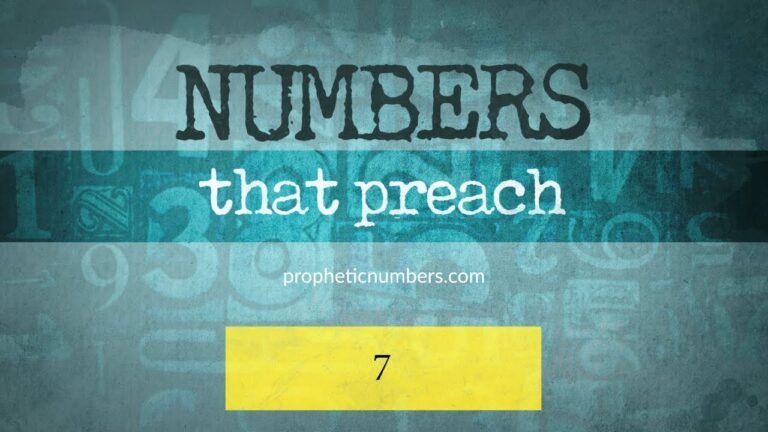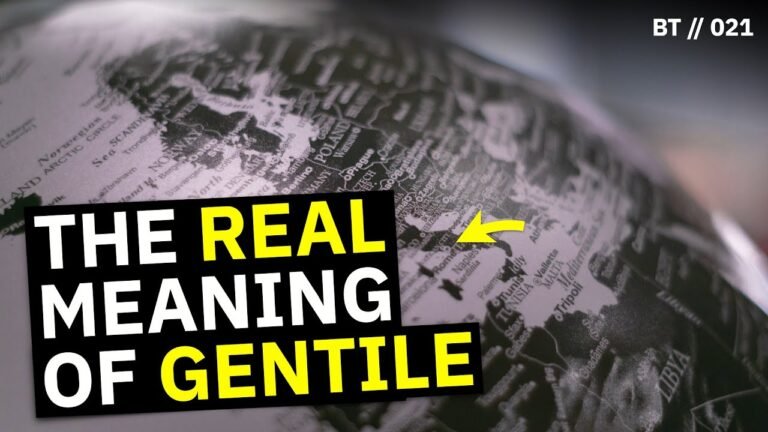The Significance of the Biblical Number Seven
The biblical number seven holds profound significance throughout scripture, symbolizing completeness and divine perfection. From the seven days of creation in Genesis to the seven seals in the Book of Revelation, this number weaves a tapestry of spiritual meaning and cultural resonance. Its recurring presence invites exploration into how it shapes beliefs and traditions, reflecting humanity’s quest for understanding the divine order. As we delve into the layers of the biblical number seven, we uncover not only its historical context but also its enduring influence on faith and practice today.
- Symbol of Completeness: The biblical number seven often represents completeness and perfection, as seen in the seven days of creation in Genesis.
- Covenant and Promise: Seven is frequently associated with divine covenant and promises, such as God’s covenant with Noah after the flood, which involved the number seven in sacrifices.
- Spiritual Significance: The number seven appears throughout the Bible in various contexts, including the seven seals, seven trumpets, and seven churches in the Book of Revelation, highlighting its spiritual importance.
- Ritual and Worship: In Jewish tradition, the number seven is significant in rituals, such as the seven days of Passover and the seven weeks leading to Shavuot, emphasizing its role in worship and observance.
- Symbol of Rest: The seventh day, or Sabbath, is a day of rest in Judeo-Christian traditions, signifying not only physical rest but also spiritual renewal and connection with God.
What is the biblical significance of the number 7?
The number seven holds profound significance in the biblical narrative, symbolizing completeness and perfection. In the creation story of Genesis, God completed His work in six days and rested on the seventh, establishing a divine rhythm of labor and rest. This act not only underscores the importance of rest but also marks the seventh day as a sacred and holy time, inviting humanity to pause and reflect.
Moreover, the journey to the number seven represents a progression from chaos to order, illustrating a transformative process. Each step along the way indicates a deliberate movement toward wholeness, with seven serving as the ultimate destination that signifies fulfillment. This linear journey encapsulates the biblical theme of creation, where every element plays a vital role in achieving the complete picture.
In essence, the number seven encapsulates a rich tapestry of meanings within the biblical context, intertwining concepts of rest, completion, and divine purpose. It invites believers to embrace the fullness of life as they navigate their own journeys, ultimately leading them to a deeper understanding of their relationship with the divine and the world around them.
What does the number 7 signify spiritually?
The number 7 holds profound spiritual significance, embodying the essence of wisdom and protection. It is associated with the Greek goddess Athena and the Roman goddess Minerva, both revered as guardians of cities and symbols of strategic warfare. Those connected to this number are often seen as insightful and introspective individuals, gifted with intuition and a strong sense of truth. This sacred number invites deeper reflection and encourages a quest for knowledge, making it a powerful symbol in the realm of metaphysical philosophy.
Is the number 7 associated with the Holy Spirit?
The number seven holds significant meaning in biblical texts, symbolizing completion and wholeness. This concept is notably reflected in the books of Zechariah and Revelation, where seven is often associated with divine perfection and fulfillment. As such, the idea of a sevenfold spirit in Revelation serves as a powerful representation of the Holy Spirit, emphasizing its completeness and multifaceted nature.
By portraying the Holy Spirit as sevenfold, the scriptures highlight its comprehensive role in spiritual life and guidance. This symbolic representation invites believers to understand the Holy Spirit not just as a singular entity but as a profound and complete presence within the divine framework, embodying various attributes and functions that enrich the spiritual experience.
Unveiling Divine Patterns in Scripture
Throughout history, sacred texts have been revered not only for their spiritual wisdom but also for the intricate patterns woven throughout their narratives. These divine patterns serve as a roadmap for believers, guiding them through life’s complexities and revealing deeper truths about existence. By examining the structural and thematic elements of scripture, we uncover a rich tapestry that connects disparate stories, highlighting universal principles that resonate across cultures and epochs.
As we delve deeper into these scriptures, we find that recurring motifs—such as sacrifice, redemption, and love—emphasize a divine purpose that transcends time. Each story, while unique in its context, reflects a common quest for understanding and connection with the divine. This exploration invites readers to engage with the text not just as historical accounts, but as living documents that offer insights into their own spiritual journeys. The patterns present within these narratives beckon us to reflect on our lives and consider how they align with the greater narrative of humanity.
Ultimately, unveiling these divine patterns enriches our understanding of scripture and deepens our connection to our faith. By recognizing the interconnectedness of these stories, we cultivate a sense of belonging to a larger spiritual narrative that spans generations. This awareness inspires us to seek out meaning in our own experiences, encouraging us to embrace the divine patterns at play in our lives, and empowering us to share this wisdom with others in our communities.
The Power and Purpose Behind Seven
The number seven has long captivated human imagination, symbolizing completeness and perfection across various cultures. From ancient mythology to modern spirituality, seven represents a cycle of transformation and renewal. In many traditions, it signifies the union of the spiritual and the material, embodying harmony and balance. This powerful number is often associated with significant events, such as the seven wonders of the world or the seven days of creation, highlighting its role in shaping human history and understanding.
Beyond its historical significance, seven continues to influence contemporary thought and practices. It appears in psychology, where the “magical number seven” refers to the limit of items our short-term memory can effectively handle. In everyday life, people often seek out seven for meaningful rituals—whether it’s the seven colors of the rainbow or the seven continents. This enduring allure underscores the importance of seven as a symbol of unity and purpose, reminding us of the interconnectedness of our experiences and the profound impact numbers can hold in our lives.
Exploring Seven’s Sacred Symbolism
Seven has long been revered across cultures as a powerful symbol, embodying a sense of completeness and spiritual awakening. From the seven days of creation in religious texts to the seven wonders of the world, this number resonates deeply with the human experience. It represents the balance between the material and spiritual realms, offering a pathway to higher understanding and enlightenment. In nature, we find the seven colors of the rainbow and the seven continents, reinforcing the idea of unity and diversity. As we explore the sacred symbolism of seven, we uncover a profound connection that invites us to reflect on our place within the universe and the mysteries that bind us all.
Seven: A Journey Through Biblical Meaning
The number seven holds profound significance throughout the Bible, symbolizing completion and divine perfection. From the seven days of creation in Genesis to the seven seals in Revelation, this number appears repeatedly, reminding believers of God’s ultimate authority and the fulfillment of His promises. Each mention of seven carries a weight of meaning, emphasizing the idea that God’s plan is meticulously designed and perfectly executed.
In addition to its role in creation, seven often represents covenant and divine intervention. The Israelites marched around Jericho for seven days, culminating in the dramatic collapse of its walls on the seventh day, showcasing God’s power to deliver His people. Similarly, the seven feasts outlined in Leviticus serve as sacred reminders of the relationship between God and humanity, marking moments of spiritual significance and communal celebration.
As we explore the biblical journey of seven, we uncover layers of insight into faith and spirituality. Each instance invites reflection on the completeness of God’s work and the promise of renewal. Through the lens of seven, believers are encouraged to embrace a deeper understanding of their faith, recognizing that within each cycle of completion lies the potential for new beginnings and greater purpose.
The biblical number seven resonates deeply through history, symbolizing completion, divine perfection, and spiritual significance. Its recurring presence in sacred texts and traditions invites reflection on the profound meanings it carries in our lives. Embracing the essence of seven can inspire a deeper understanding of our own journeys, illuminating paths of faith, growth, and unity. As we explore the layers of this powerful number, we uncover not just a numeral, but a rich tapestry woven into the fabric of our spiritual heritage.






